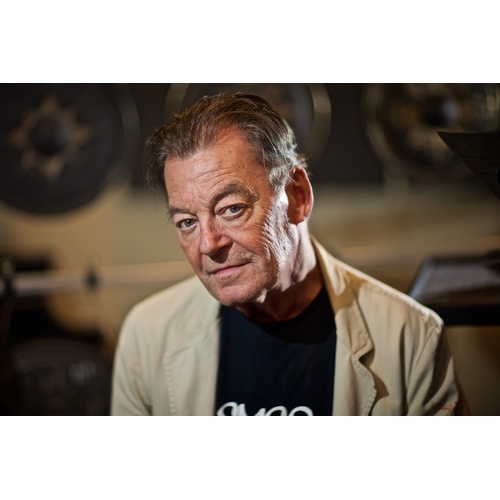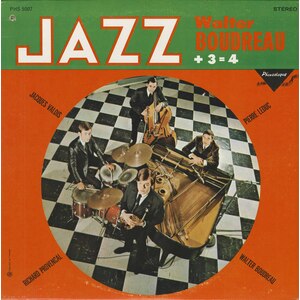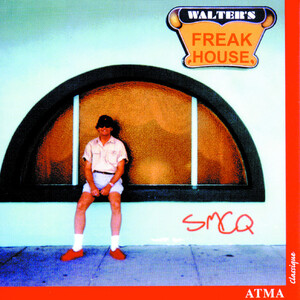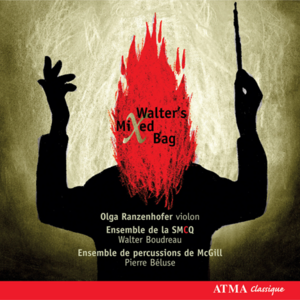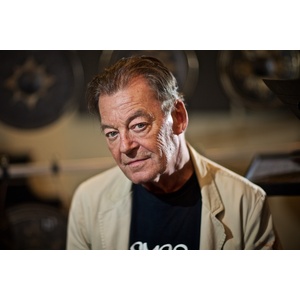Boudreau, Walter
Websites:
https://www.thecanadianencyclopedia.ca/en/article/walter-boudreau-emc
Origin:
Montréal, Québec, 🇨🇦
Biography:
Walter Boudreau. Composer, saxophonist, conductor (born on 15 October 1947 in Montreal, Qc). He studied piano for several years in Sorel. and later saxophone with Doug Michaud in Montreal. However, he was initially self-taught as a composer. At 15, he became a member of a jazz band conducted by Arthur Romano.
Education and Early Career
Walter Boudreau studied piano for several years in Sorel and later saxophone with Doug Michaud in Montreal. However, he initially self-taught himself as a composer. At age 15, he became a member of a jazz band conducted by Arthur Romano. He settled in Montreal in 1966, where he directed his own jazz group. He also led various other jazz groups at the Youth Pavilion of Expo 67, where he met Raoul Duguay. With the latter, as well as with the Quatuor de jazz libre du Québec and other musicians, he founded Infonie in 1968. Infonie was a multi-media ensemble whose repertoire was a mixture of classical, pop, contemporary and avant-garde music. The group, which numbered as many as 22 musicians, performed throughout Quebec. They also performed at the University of Toronto, and at the NAC. Boudreau appeared in the films La Nuit de la poésie (1970) and L'Infonie inachevée (1972), and published Le Manifeste de l'Infonie: le ToutArtBel (Montreal 1970), which was published by Duguay. Segments from the latter piece inspired Boudreau's Ysengouronnie.
While working with Infonie, Boudreau studied analysis 1968–70 with Bruce Mather at McGill University. Between 1969 and 1973, he studied analysis and composition with Gilles Tremblay at the CMM and with Serge Garant at the University of Montreal. He received several grants from the Canada Council. This enabled him to attend summer courses given by Pierre Boulez in Cleveland in 1971 and by Mauricio Kagel, György Ligeti, Karlheinz Stockhausen and Iannis Xenakis in Darmstadt in 1972.
That same year, Infonie became an octet. After studying in France with Xenakis in 1973–74, Boudreau transformed it into the Quatuor de saxophones de l'Infonie. In 1982, it became the Montreal Saxophone Quartet. The group included Simon Stone (soprano), René Masino (alto), David Clark (tenor) and Boudreau (baritone). The ensemble presents a varied, though mainly contemporary repertoire. The quartet toured in 1977–78 in the Maritimes and in 1981 in British Columbia. They were sponsored by the YMC and the Festival Concert Society. The ensemble also performed at the World Saxophone Congress in Chicago (1979), and in Montreal, Quebec City and Toronto, as well as on CBC radio and TV.
Between 1973 and 1976, Boudreau worked with the research team Informatique-musique at the Université de Montréal. After winning a first prize in the 1973 CBC National Radio Competition for Young Composers (CBC radio competitions), the second version of Variations I was presented on a CBC broadcast in 1974. A final, hour-long version (called Variations) was conducted by Boudreau at a Société de musique contemporaine du Québec (SMCQ) concert in 1976. Gilles Potvin from Le Devoir described it as “a fantasies-filled sound labyrinth .” Potvin emphasized the composer's “unlimited imagination.”
Career Works
The majority of Boudreau's works are commissions, notably by the McGill Percussion Ensemble (1977), the Vancouver New Music Society (1978), the Ensemble d'ondes de Montréal (1980), the Ensemble de cuivres d'Aquitaine, France (1982) and I Musici de Montréal (1985).
In 1982, the Canadian Music Council awarded him the Jules Léger Prize for New Chamber Music for his L'Odyssée du soleil.
He was a member of the Groupe des sisses with Michel-Georges Brégent, Michel Gonneville, Denis Gougeon, Alain Lalonde and John Rea. He participated in the composition and the creation of collective works such as La Folia (1984) and Musique des jardins sans complexe (1987). This last work was used to make the short film Fanfares ( Rhombus Media 1988).
In 1991, Boudreau’s composition, Golgot(h)a, was awarded the Grand Prix Paul-Gilson by the Communauté des radios publiques de langue française. The piece notably uses a text written by Raoul Duguay.
In 2012, Boudreau wrote his Concerto de l’asile. The piece was performed by the pianist Alain Lefèvre and the Montreal Symphony Orchestra in 2013.
Conductor and Artistic Director
As a conductor, Boudreau has appeared alongside the National Arts Centre Orchestra, the Orchestre métropolitain, the SMCQ Ensemble and the ensemble of the Événements du neuf. Boudreau also conducted for CBC radio recordings. He was appointed to a two-year term as composer-in-residence of the Toronto Symphony Orchestra beginning in September 1990.
In 1988, Boudreau became the SMCQ’s artistic director. He held the position until September 2021 when he retired at the age of 73. As a director, Boudreau spearheaded many important initiatives. Boudreau’s massive project, Symphonie du Millénaire (2000), attracted 40,000 spectators. The project cost 1.3 million dollars. He helped set up the Montréal/Nouvelles Musiques festival which takes place since 2003. Since 2007, the SMCQ under Boudreau organizes the series Hommage à nos compositeurs. This series promotes Quebec composers.
Boudreau is an associate of the Canadian Music Centre. In 2009, the centre named Boudreau as a CMC ambassador in recognition of his contribution to Canadian new music.
In recognition of his remarkable career, Boudreau was made a knight of the Ordre national du Québec in 2013. In 2014, he became a member of the Order of Canada.
A composer of great originality, Boudreau already has a catalog of more than 40 works including music for orchestra, voice, instrumental ensemble, piano, percussion, as well as music for film. Winner of the first CBC Composition Competition (1974) and of the Jules-Léger Prize (1982) for new chamber music, he was awarded the Grand Prix Paul Gilson by the Community of French Language Radios for Golgot(h)a.
For the past twenty years, Walter Boudreau has directed numerous ensembles and orchestras in the interpretation of 20th century music, most of these performances being recent works and premieres. He has recorded a dozen albums for Radio Canada International (RCI), the Société nouvelle d’enregistrement (SNE), Polydor and Centrediscs.
Walter Boudreau has been artistic director and principal conductor of the Société de musique contemporaine du Québec (SMCQ) since April 1988. He was also named composer in residence to the Toronto Symphony Orchestra in September 1990.Boudreau, Walter (b. 1947, Montréal). Canadian composer of orchestral, chamber, choral, vocal, and electroacoustic works that have been successfully performed in Europe and North America; he is also very active as a conductor, specializing in new music.
Mr. Boudreau initially studied the piano and the saxophone, but began serious studies (in analysis) with Bruce Mather at McGill University, as well as analysis and composition with Gilles Tremblay at the Montréal Conservatoire and Serge Garant at the University of Montréal from 1969-73. After receiving several grants from the Canada Council, he studied in Europe and the USA with Pierre Boulez, Mauricio Kagel, György Ligeti, Olivier Messiaen, Karlheinz Stockhausen, and Iannis Xenakis. He also attended private computer music workshops in San Diego and Vancouver.
He became conductor of his own jazz quartet in 1965. In 1968, together with the poet Raoul Duguay, he founded the ensemble l’Infonie, which performed unique pieces combining elements of contemporary music, happenings, jazz, and multimedia. The ensemble disbanded in 1973, after giving more than 200 concerts.
Since 1988, he has been Artistic Director of the SMCQ and its ensemble and from 1990-93, he served as the first composer-in-residence with the Toronto Symphony Orchestra. Since 1993, he has also conducted the Montréal ensemble the Dangerous Kitchen, devoted to the performance of the works of Frank Zappa. In addition, he has been co-director (with Denys Bouliane) of the annual new music festival Québec-Musiques-au-présent since 1998.
He has received numerous awards, including First Prize at the CBC Competition for Young Composers (1974), the Jules Léger Prize for New Chamber Music (1982) and the Grand Prix Paul Gilson from the CRPLF in Paris (1991). More recently, he received several prizes from the Québec Music Council, including the Composer of the Year Award (1998), as well as two awards for his work with Québec-Musiques-au-présent (1999) and one for the huge project La symphonie du millénaire (2000).
As a conductor, he has received the Grand Prix from the Conseil des Arts de la Communauté Urbaine de Montréal (CACUM) (1991) and the Best Album of the Year (Contemporary Music category) from the Québec Music Council (1997) and has conducted most of the major ensembles and orchestras across Canada.
His works have been performed throughout Canada and also in Belgium, Finland, France, Germany, Poland, and the USA. In addition to the works listed below, Mr. Boudreau has composed more than 15 ballet and film scores.
CONTACT INFORMATION
E-mail address: walter.boudreau@smcq.qc.ca
Telephone (home): 514 276 8293
Telephone (SMCQ): 514 843 9305
COMPLETE LIST OF WORKS
ORCHESTRAL: Ubiquital II, small orchestra (23 players), 1972; Ubiquital III, small orchestra (15 players), 1972; Morceaux, string orchestra, 1976; Incantations Va (Le cercle gnostique IXd), 12 strings, 1985-86; Berliner Momente I, 1988; Tradiderunt me in manus impiorum I, 1989; Tradiderunt me in manus impiorum II, large orchestra, 1991; Berliner Momente II, 1991; Berliner Momente III, large orchestra, 1992-93; Le matin des magiciens (Incantations VII [Le cercle gnostique IXh]), gamelan orchestra, 1995-96; Berliner Momente IV, large orchestra, 1996-97; La vie d’un héros, violin, string orchestra, 1998-99
CHAMBER MUSIC: Ubiquital I, 2 flutes, 2 clarinets, 4 saxophones, 4 French horns, 4 violins, 4 celli, prepared clavinet, percussion, 1971; Variations I, piccolo (+ tenor saxophone), flute (+ alto saxophone), soprano saxophone, trombone, electric guitar, amplified double bass, piano (+ celesta), 3 percussion, 1973-75; Les sept jours, 8 percussion, 1977; L’Odyssée du soleil (Le cercle gnostique III), 2 French horns, piccolo trumpet, 3 trumpets, trombone, bass trombone, tuba, 1978; Incantations I (Le cercle gnostique IV), 4 saxophones, 1979; Incantations I (Le cercle gnostique V), 4 saxophones, 1979; Amon-Râ (Le cercle gnostique V), 5 ondes Martenot, 1979; Demain les étoiles (Le cercle gnostique VI), 12 saxophones, 1980; Contact-Itinéraires (Le cercle gnostique VII), flute (+ piccolo), oboe (+ English horn), clarinet, French horn, bassoon, 1981; La Toc (Le cercle gnostique VIIa), 12 percussion, 1981; Carrousel-Constellations (Le cercle gnostique VIII), flute (+ piccolo), cello, 2 pianos (both + celesta), percussion, 1982; Voyage au centre du soleil (Le cercle gnostique IX), 4 trumpets (1st, 2nd + piccolo trumpet), 2 trombones, bass trombone, tuba, percussion, 1983; Cocktail Music (Musiques entre 5 et 7), alto saxophone (+ percussion), percussion, 1983; Coffre IIIa (Incantations IV [Le cercle gnostique I]), flute/clarinet, cello, piano, 1978-84, revised 1993; Incantations III (Le cercle gnostique IXa), 2 piccolos (both + flute), 2 flutes (both + alto flute), 2 oboes (2nd + English horn), 2 clarinets (2nd + bass clarinet), bassoon, contrabassoon, 1983-84; Incantations III (Le cercle gnostique IXa), 2 piccolos (both + flute), 2 flutes (both + alto flute), 2 oboes (both + English horn), 2 clarinets (2nd + bass clarinet), bassoon, contrabassoon, 1983-84; Lent(e) ré concentr(e)ré à la Boudrini, bagpipes, ensemble (oboe [+ English horn], bass clarinet, trumpet, trombone, violin, viola, cello, 2 percussion), 1984 (section from La Folia; collaboration with numerous other composers); Incantations V (Le cercle gnostique IXc), flute (+ piccolo, bass flute), clarinet, violin, viola, cello, piano, 1985; Hommage à Ste-Cécile, 4 French horns, 4 trumpets, 2 trombones, 2 tubas, 4 percussion, 1987; Versus, flute (+ piccolo), oboe, clarinet, bassoon, 2 French horns, trumpet, trombone, piano, 3 percussion, 1987; Wallongements, flute (+ piccolo), oboe, bass clarinet, alto saxophone (+ soprano saxophone), tuba, 2 synthesizers, 1988; Encore ces questions sans réponse…, 2 piccolos, oboe, E-flat clarinet, clarinet, French horn, 2 trumpets, trombone, bass trombone, tuba, 4 percussion, 1991; Contact II, French horn, 2 trumpets, 2 trombones, 1992; Neuf Zéniths I (Incantations VI [Le cercle gnostique IXf]), flute (+ piccolo, bass flute), oboe (+ English horn), clarinet, French horn, trumpet, trombone, violin, viola, cello, piano, percussion, 1992; Encan-Tension, trumpet, 2 trombones, percussion, 1993; Neuf Zéniths II (Incantations VIa [Le cercle gnostique IXg]), flute (+ piccolo, bass flute), oboe (+ English horn), clarinet, French horn, trumpet, trombone, violin, viola, cello, piano, 2 percussion, 1994-95; Le diable dans le beffroi, flute (+ piccolo), oboe (+ English horn), clarinet, French horn, bassoon, 1997-98; Le grand méridien, string quartet, 2001-02
CHORAL: Coffre II (Le cercle gnostique II), 12 basses, large orchestra, 1975; Golgot(h)a, voice, mixed chorus, 2 French horns, 2 trumpets, trombone, bass trombone, tuba, organ, 5 percussion, sampler, 1990; La symphonie du millénaire, choruses, organ, carillon, 15 church bells, 2000 bell ringers, 2 fire trucks, large orchestra (333 players), 1999-2000 (collaboration with 19 other composers); Golgot(h)a (Le voyage), mezzo-soprano, mixed chorus, orchestra, 1999-2002
VOCAL: Variations II, Dans les champs il y a des bibittes, soprano, orchestra, 1973-74, revised 1983; Coffre I, soprano, flute/soprano saxophone, oboe (+ English horn)/alto saxophone, French horn/tenor saxophone, trombone/baritone saxophone, 2 percussion, 1975; Coffre III (Le cercle gnostique I), soprano, flute (+ piccolo, alto flute, bass flute), guitar, 1976-77
PIANO: Les planètes (Le cercle gnostique IXe), 1984-98
ELECTROACOUSTIC: Pain-Beurre, 5 mixed voices, piano, synthesizer, percussion, tape, feedback system, 1969; Ysengouronnie, speaker, 2 flutes, clarinet, soprano saxophone, 3 trumpets, 2 trombones, percussion, tape, 1970-71; Chaleurs, 4 saxophones, tape, 1985
(Last updated on August 26, 2002)
